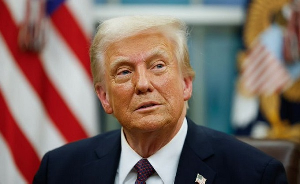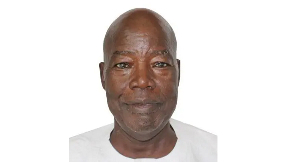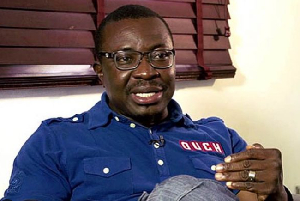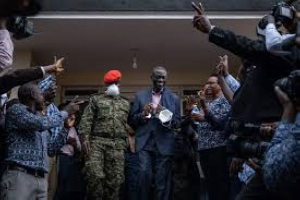Billaw……..The last two weeks witnessed a jumpy political discourse all over the media over a speech presented by one Sam Jonah on his reflections on the future of our country, Ghana. Indeed, the speech was well packaged and so powerful that it touched on almost all facets of our lives as a country.
In what appears to be an expression of a personal opinion on the future of the nation; yet most people disagreed with him in the same magnitude as others agreed with all that he said, line hook and sinker.
Be that as it may, the thematic concern of this paper is to subject the new found theory of executocracyto an unbiased scrutiny in the light of the political doctrine of separation of powers through the lenses of the constitution, 1992.
In retrospect, Sam Jonah’s theory of executocracy basically stipulates that the powers granted the executive arm of government, headed by the president pursuant to article 58 (1) of the constitution, 1992 are in excess and in most cases even unnecessary. To him, it makes the executive arm of government too powerful and domineering over the others; thus, the legislature and the judiciary.
He says “The 1992 constitution is the basis for our current democratic dispensation. It created a monstrous executive which looms large over the other arms of governance structure, and for 28 years, we have failed to make any meaningful changes to strengthen our democracy”
The effect of this outburst is that, the governance structure, created by the constitution, 1992 does not allow for the smooth operation of the concept of separation of powers and check and balances because, it has given too much powers to the executive arm of government.
Fast forward, separation of powers may be regarded as a political doctrine where the three arms of government, mainly the executive, the legislature and the judiciary are made to make independently and separately in the performance of their duties in terms of personnel, functions and institutions.
This means that, under the classical school of thought, there should be absolute separation among the three arms of government. I am totally convinced, both in substance and in fact that Sam K.Jonah seem to belong to this school of thought which advocates for absolute separation of powers; because he says he does not understand why the president will have to appoint most of his ministers from parliament under article 78 (1) of the constitution, 1992 neither does he seem okay as to why the chief justice should be appointed by the president.
Ironically and by the same token, Sam Jonah, either by an ill-motive intended, or genuine inadvertence, woefully failed, refused and or ignored to tell us any remedy to what in his opinion amounts to this "constitutional illegality and apparent absurdity", neither did he tell us that the executive arm of government also depends in so many ways on the legislature and the judiciary to perform its functions and that in most cases, the powers of the executive, are even limited.
Unlike the classical school of thought, the contemporary school of thought holds that even though the three arms of government are expected to work separately and independently in their roles, they must work collectively and interdepend on each other towards achieving their objectives. In the light of the above development, it is safe enough to argue that, Sam K.Jonah seemed to have eaten his yam without first peeling it.
It is instructive to note that, governance is a complex process that requires the efforts of more hands to co-operate and work collectively, where necessary, towards achieving a common goal. Indeed, it becomes more complex as the population of a people increases couple with technological evolution, requiring a division of labour, yet remain interconnected and interdependent towards accomplishing a set objective.
To that extent therefore, it would not only be logically defective but untenable to argue that the three arms of government must ensure ABSOLUTE separation of powers in terms of functions and personnel.
Even though the “midwives” of the constitution, 1992 clearly spelt out the structure of the organs of government in terms of functions, personnel and institutions, same constitution, 1992 deems it fit to recognize the fact that for the effectiveness of the political doctrine to operate, the various arms of government must still co-operate, interdepend and interrelate among themselves in the performance of their functions.
Thus, the power to legislate is vested in the legislature under article 93(2) and the constitution has clearly stated the procedures that parliament will follow in making laws for the country under article 106 of the constitution, 1992.
Again, the executive powers of the state are vested in the president under article 58 (1) of the constitution, 1992 and that of the powers of the judiciary are vested in the superior and lower courts pursuant to article 125 (3) of the constitution, 1992.
The above development notwithstanding, the constitution, 1992 which Sam Jonah described as having created a “monstrous executive” has recognized the fact that, the three arms of government must still work collectively, yet maintain their distinct roles.
For instance, article 78 (1) permits the president to appoint most of his cabinet ministers from among Members of Parliament. It is instructive to note that, this appointment is not an automatic assumption to becoming a minister of state.
Indeed, such appointees are subject to a vigorous vetting process by the legislature. Any constitutional law student would agree with me on this line of reasoning, keeping in mind, the case of JH Mensah (19961997) SC GLR 320.
In the light of the above, there is the existence of some kind of relation or a fusion between the executive and the legislature in terms of personnel which the framers of the constitution think it is necessary for our national cohesion and development, taking into cognizance, the political history of our current constitution, 1992 as a “political document and a living organism capable of growth and development.”
Furthermore, the constitution also empowers the executive to enter into treaties for and on behalf of the country under article 75 (1), yet article 75(2) equally empowers the legislature, to subject such treaties entered into by the president or caused to be entered into by the president to parliamentary ratification before they would be deemed effective.
Consequently, this paper submits that, even though the executive arm of government seems to have ‘excess powers” over the other arms of government, these powers are not without limit.
And that to the extent that there is checks and balances on the powers of each arm of government by another arm of government as demonstrated above, this paper demurs vehemently, the complete branding of the executive arm of government as “EXECUTOCRACY”.
This paper further submits that, taken into account, our past experiences, disappointments, hopes and aspirations as a nation, and also recognizing, the period within which the current constitution, 1992 was promulgated, it was very necessary and indeed, reasonable for the framers of the constitution to ‘share the powers’ of governance among the three arms of government the way they did.
# PAX VOBISCUM
Opinions of Saturday, 1 May 2021
Columnist: Bassing Kamaldeen















